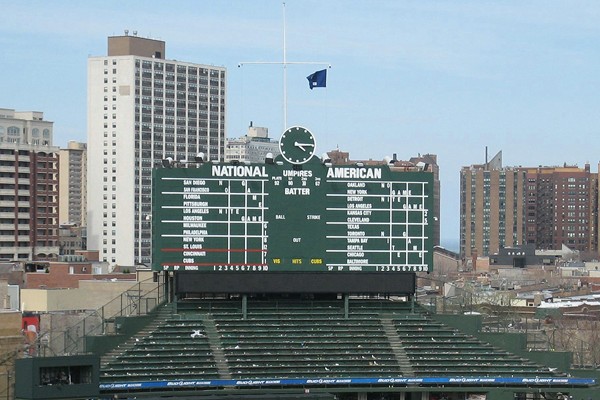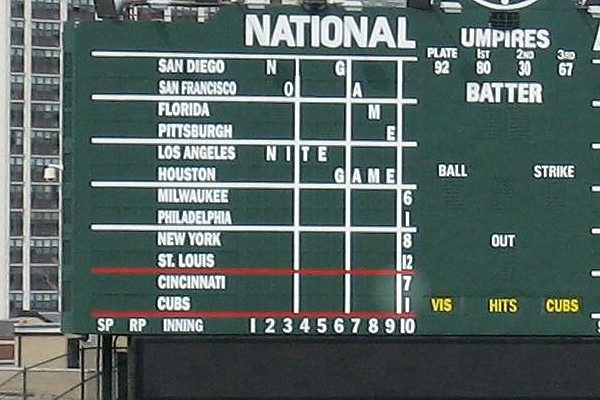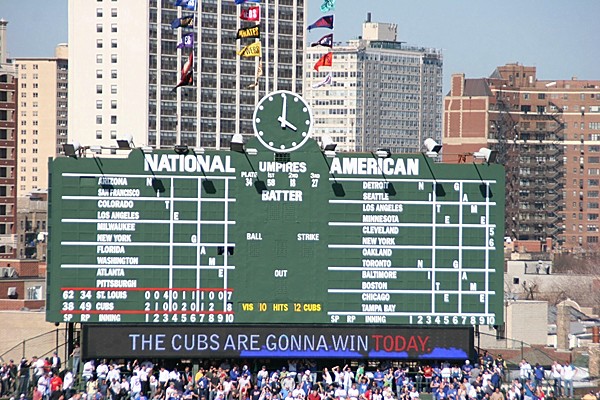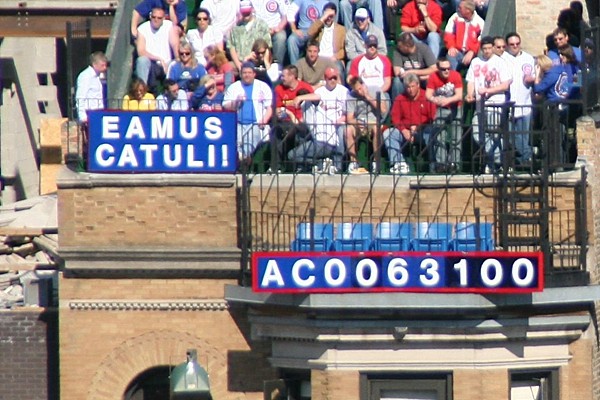Given the Cubs' recent performance, last night's 8-2 loss against the first-place Marlins doesn't sound that far out of the ordinary.
Then you see the box score, and see that the Marlins got 6 of their runs in the 10th inning, and you start to cry. Yes, the 10th.
I actually left the park after the 4th run in the top of the 10th. The Cubs still hadn't gotten the first out by the time I made it to Addison.
I'll be there Monday, when (one hopes) they will not lose quite as badly to the Giants.
I'm returning from San Francisco this afternoon, so tomorrow I'll have photos from Saturday's A's game and, if I get my very own YouTube account, a video of my sister's dog. I'll leave that for now.
This morning, just a link: TheExpiredMeter.com, of interest to anyone who deals with the Chicago parking system. I found it because I discovered only yesterday that, sometime today, my car will get a parking ticket. I discovered this when my alderman's office sent a notice of street sweeping yesterday saying they'll be sweeping the block my car is on today. A little more notice might have helped. Welcome to summer in the city.
So confusing.
At my last Cubs game, they beat the Cardinals to get into first place. But here's yesterday's result:

Let's see that in close-up, just to drive home the pathos and pain:

So yesterday, as they got schooled by the fourth-place Reds, St. Louis won their game. So the Cubs swapped places with Reds and dropped to 4th place.
It's going to be one of those seasons...
The Chicago Tribune reports today that the City Council now, five months later, wants to have hearings about the late-night, rush-rush, badly-managed parking meter privitization they pushed through in December:
Less than five months after the Chicago City Council quickly and overwhelmingly approved the deal, aldermen buffeted by public complaints pushed a slew of ordinances Wednesday targeting the $1.2 billion lease of Chicago's parking meters to a private company.
One measure calls for hearings to examine the deal, which ushered in dramatic rate hikes at 36,000 meters across the city. Another would halt rate increases until all meters are uprooted and replaced with "pay and display" equipment allowing motorists to pay with credit cards and place tickets on their dashboards. Yet a third would require a 30-day waiting period before aldermen could approve any plan to privatize city assets.
The proposals appear aimed at giving aldermen political cover amid widespread discontent and technical problems as the parking meter system transitions to private control.
Not that people don't carry around buckets-full of quarters wherever they go. Not that charging the same price for parking all the time and throughout the city fails to take account of the fundamental principles of demand economics. No, now let's have hearings.
I can't tell whether they were stupid or if they all got paid off. That's how badly they handled this. (Usually in Chicago the politicians aren't actually stupid, they just lose IQ points when confronted with fat envelopes.)
(Mudville is that $1.5 billion park just over the Harlem River in the Bronx.) The Yankees had a disappointing 2nd inning hosting the Indians yesterday as Cleveland set a new Major League record:
A 37-minute top of the second at Yankee Stadium saw the Tribe put up 14 runs on 13 hits off right-handers Chien-Ming Wang and Anthony Claggett. The big inning, which set the Tribe on course for its eventual 22-4 victory, tied for the most productive inning in Indians history and set a record for the most productive inning by an opponent in Yankees history.
The 14 runs set a Major League record for the most in the second inning. The record was 13, and it was last accomplished, ironically, by the Yankees exactly four years ago against Tampa Bay.
In other news, the Cubs beat the Cardinals yesterday 7-5 at Wrigley after 11 innings.
This, I think, says it all...almost:

Sadly, this says the rest:

They had to make a new sign this year, because the old one only went up to 99 years. Sigh.
Quick update:
- The Titanic dinner at Mint Julep Bistro was wonderful. Rich's wine pairings especially rocked—as did his beef tournedos in port reduction. Mmm. Not so much fun was Metra's return schedule (featuring a 3-hour gap between 21:25 and 0:35), nor my reading of it (I did not remember this three-hour gap). The fine for taking public transit out to the suburbs (because driving to a 10-course, 9-wine-plus-apertif dinner seemed irresponsible) was $80, paid to the All-Star Taxi Service.
- I did, in fact, buy a Kindle, and I love it. I've now read three books on it and numerous articles (converting a .pdf or text file costs no more than 10c for automatic downloads), and I hardly notice the machine. It only holds 1.5 GB of stuff, but the complete works of Shakespeare ($4) only takes up 4 MB so space is not exactly at a premium.
- I may have a new release of Weather Now out today; if not, then tomorrow morning. I'll be writing over the next few days more about what's different, and why it took nearly two years to produce something that, to some, will look almost identical.
- Tangentially about my Kindle and software releases, I'm now reading Almost Perfect (hat tip Coding Horror), Pete Peterson's account of the rise and fall of WordPerfect. It's a fascinating tale of what happens when everyone in the company is just like you, and when entrepreneurs can't let go.
Finally, in a tiny piece of good news, it looks like we'll have tolerable weather Friday for my first Cubs home game this season.
American Airlines, my carrier of choice, will finally replace its fleet of awful MD-80s, many of which it inherited from TWA:
The acquisition of 76 Boeing 737-800s through early 2011 represents a doubling of that airplane model flown by Ft Worth-based American.
All the new planes will be based at O'Hare International Airport.
The move also will lead to the eventual retirement of American's McDonnell Douglas MD-80s--a reliable but noisy aircraft that gulps 35 percent more fuel than the 737-800.
American plans to phase out its 280 MD-80s over about 10 years, said Dan Garton, the carrier's executive vice president of marketing.
"All of the new planes will be based at O'Hare..." Sigh. That makes me so happy.
The Chicago Tribune has a photo history of the disaster that shut down Chicago's Loop 17 years ago today. Worth a look.
A couple of weeks ago I mentioned a Tribune article about how the U.S. lags the rest of the industrialized world in rail technology. The Economist this week continues the discussion:
There are reasons, however, to be cautious. First, the cost of any one project far exceeds the money available. California, which has the most advanced plan, would connect the state's biggest cities with trains running at more than 200mph. In November Californians approved $9.95 billion of bonds for the project. On top of this, officials hope to get $12 billion-16 billion from Washington. The plan is expected to cost $40 billion in all. But the stimulus contains only $8 billion for the whole country.
Second, many plans would make trains high-speed only in a relative sense. Proposals that are cheaper than California’s are also much slower. A plan for the Chicago-St Louis line, for example, would speed up trains from 79mph to only 110mph. Multiple road crossings require trains to move more slowly than in Europe. Adding to the problem, most passenger trains run on track owned by freight railways. Congestion makes service less reliable.
I'm actually sad to see $2 gasoline again, because I think a couple years of gas prices around $4 (or even $9, like in Europe) would finally give us a decent rail system. So the next time I fly to London I'll take solace in the Heathrow Express when I get there, and try to forget about the Blue Line that brought me to O'Hare. (Though, in fairness to the CTA, in the past two years they have cut the trip from the Loop to O'Hare from an hour and a quarter down to 40 minutes.)